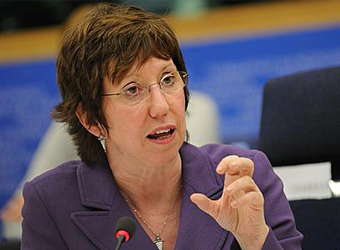The European Union has voiced alarm over “the reported use of force, arrests and disproportionate sentences” directed at protesters, measures the bloc said would hinder the country’s transition to democracy.
A spokesperson for EU foreign policy chief Catherine Ashton said on Sunday that she had been following the reports on recent events in Egypt “with great concern.”
Last week a new law regulating protests was enacted. The legislation requires protest organisers to inform the police at least three days prior to any planned demonstration of more than ten people, and gives police powers to ban planned demonstrations if they constitute a threat to public order.
Since the passing of the law, police have cracked down on several demonstrations with water cannon and teargas, and have arrested dozens of protesters. Several leading activists have been charged with violating the provisions of the law.
Also last week, an Egyptian court sentenced 21 women and girls to 11 years in prison for charges including sabotage, belonging to a terrorist organisation, and obstructing traffic.
The defendants had participated in a protest in support of toppled president Mohamed Morsi in Alexandria in October. They have maintained it was a peaceful protest.
“Such measures, including under the new law on demonstrations, violate the rights and the aspirations of the Egyptian people and will never deliver real and sustainable security for the Egyptian population,” the spokesperson added.
Despite voiced concerns, Ashton signed last week a financial agreement of €90 million in assistance to Egypt to bolster socio-economic sector and civil society.
In August, the 28-country bloc restricted exports of security equipment and arms to Egypt in response to ‘mounting violence’ from Egyptian security forces but said it would maintain economic assistance.
Respecting fundamental human rights is particularly important now as the country is rounding off a revised constitution which “should safeguard the rights and obligations of all Egyptians,” added the statement.
A constitution writing panel resumed on Sunday its final voting on the amended national charter, five months since Mohamed Morsi, the country’s first democratically elected president, was ousted.
Once the voting is complete, the amended document will be submitted to interim President Adly Mansour to then be put to a referendum.



